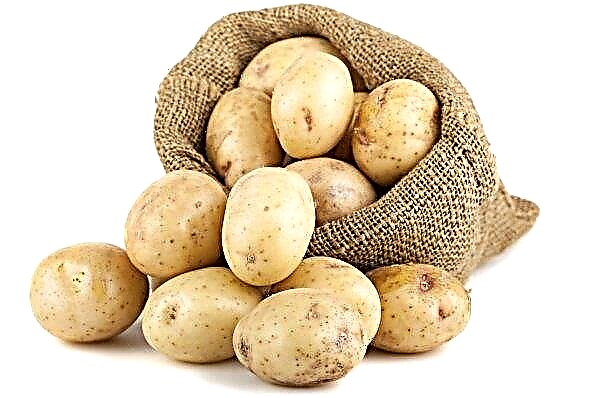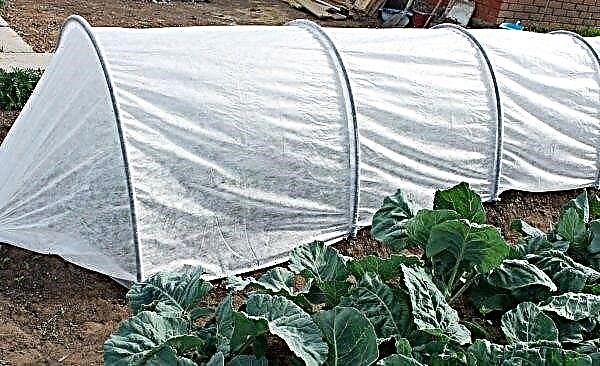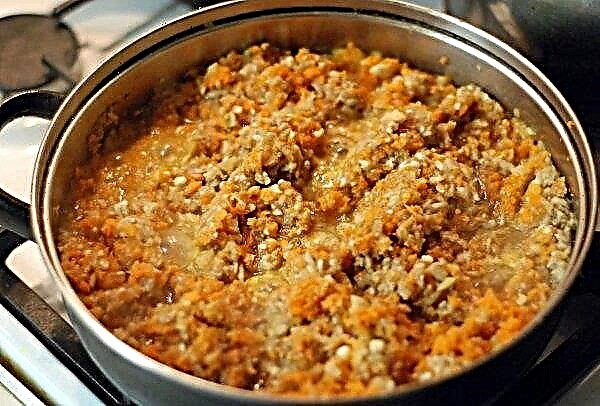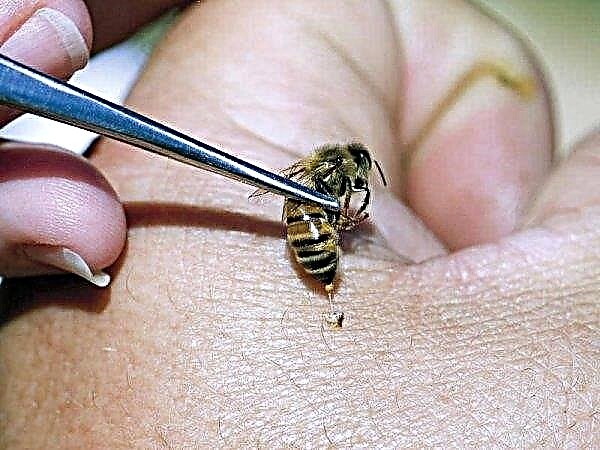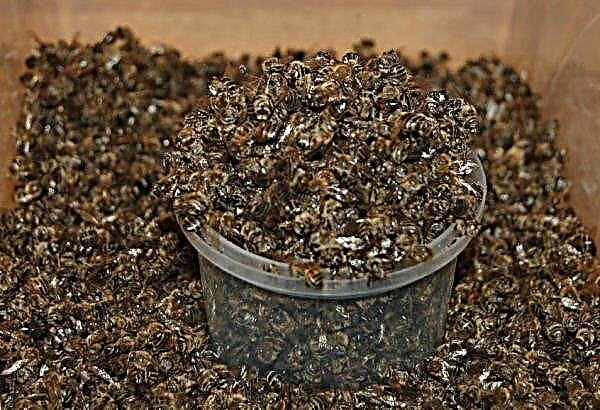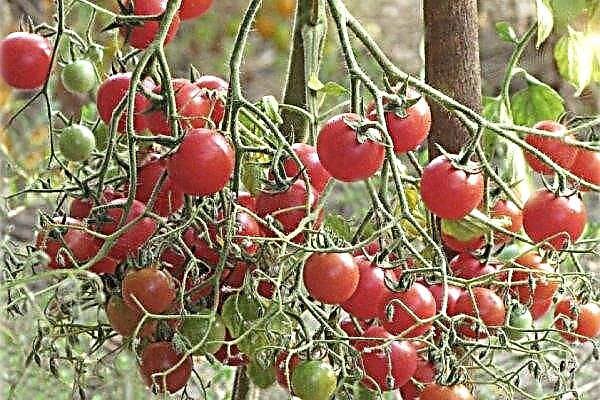Asparagus is a vegetable plant, which contains a huge amount of nutrients, minerals, vitamins, micro and macro elements, thanks to which it has medicinal properties. In this article we will consider why it should be used and how it is useful.
What is asparagus
Asparagus is a plant that tends to be both monoecious (pistils and stamens are on the same flower), and dioecious (stamens and pestles are located on different flowers). It grows in the form of a bush or grass. Shrub species are often decoration of the garden and are used as part of bouquets. Grassy asparagus, due to its palatability, is widely used in cooking.
Did you know? An asparagus recipe was discovered in the oldest cookbook in the world - De re coquinaria — the author of which was the Roman gourmet Apicius.
Calorie content and chemical composition
Consider in the table what the beneficial plant contains in its composition, what vitamins are in asparagus, how many proteins, fats, carbohydrates and kcal are contained per 100 grams:
| Energy value | 20 kcal |
| BZHU |
|
| Alimentary fiber | 1.5 g |
| Water | 93 g |
| Ash | 0.5 g |
| Vitamins |
|
| Minerals |
|
What is useful asparagus
Having learned from the previous paragraph what asparagus consists of, it becomes clear that it is a storehouse of useful substances. In addition to the fact that it is easily absorbed by the body, it belongs to low-calorie foods and has many medicinal properties.

Asparagine enters the asparagus, with the help of which blood pressure decreases, blood vessels dilate. It also helps to remove ammonia from the body. For those who have had a heart attack or suffer from heart disease, it is recommended to include this useful plant in the diet, since asparagine acts on the work of the heart muscle as a stimulant.
- The substances contained in this plant carry such benefits for the human body:
- provitamin A, or beta-carotene, has a beneficial effect on vision and skin condition;
- phosphorus and calcium are very useful for maintaining bone tissue;
- iron and magnesium contribute to blood formation;
- potassium acts as a diuretic, and magnesium is known for its soothing properties;
- Vitamin PP allows you to prevent the appearance of vitamin deficiency, cirrhosis of the liver, sclerosis and atherosclerosis, as well as a decrease in pressure;
- coarse fibers have a beneficial effect on the digestive process.
Check out

For men
Asparagus is beneficial for male potency and increase male libido. The presence of a large set of useful elements has a beneficial effect on the stimulation of the release of male sex hormones, which are responsible for sexual life, prolong the time of sexual activity and stamina in love games.
Until Viagra was invented, men added “magic wands” to increase the amount of seminal fluid, with reduced or absent libido or various other intimate problems.
Important! To achieve greater effect, asparagus must be consumed for at least 3 days.
For women
Asparagus has a beneficial effect on female libido, increasing sexual desire, regulates and stabilizes hormones. It is an effective remedy for infertility, and also acts as one of the ingredients in serums and creams for rejuvenation.
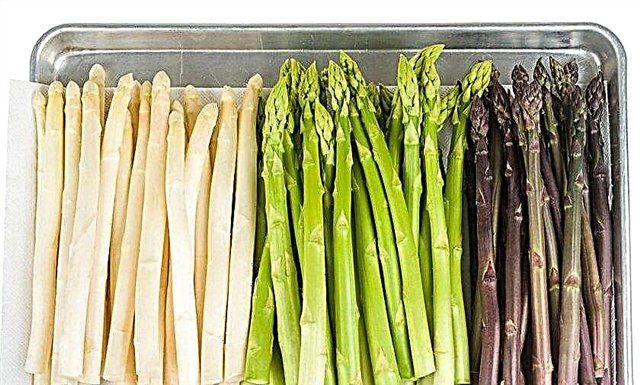
A large number of B vitamins contained in this plant positively affects the development of the fetus, so pregnant women should definitely use it. With a diuretic effect, asparagus removes excess fluid from the body well. As a result, edema is reduced, salts and toxins are eliminated, metabolism is stabilized, the digestive system improves and body weight decreases.
For children
Asparagus is a low-calorie product enriched with minerals and vitamins that are important for the growing body, so it will bring considerable benefits when included in the diet of children. It also supports immunity and warns against the appearance of signs of vitamin deficiency.
The introduction of complementary foods with the addition of this vegetable plant is recommended no earlier than the child turns 10 months old, since it can be quite difficult for the child's body and cause colic, bloating or disorder in the digestive system.Important! Before introducing asparagus into the baby’s diet, you need to consult a pediatrician who will confirm the safety of changes in your child’s nutrition.
For the elderly
Since asparagus in its chemical composition has many substances that have a beneficial effect on the heart and support the normal functioning of the heart muscle, it is indicated for elderly people.

It is able to gently calm the nervous system, lower blood pressure, acts like aspirin, thinning the blood, and prevents thrombosis. A young plant protects against the development of diabetes and atherosclerosis.
Contraindications and harm
Despite the fact that asparagus contains numerous advantages, there are also disadvantages in it. Like any plant, it has useful and harmful properties.
- It is necessary to abandon its use to people who have:
- individual intolerance or allergy to asparagus;
- peptic ulcer of the stomach, as well as the duodenum;
- diseases of the kidneys and urinary system.
Application
This herbaceous plant is widely used in cooking, cosmetology, and folk medicine. How to use asparagus so that it brings maximum benefits, we will consider further.
Did you know? In ancient Greece, asparagus was considered a plant of love. She was not eaten, but decorated with her at home and the bed of the bride and groom.
In cooking
In cooking, this plant is used in different forms: it can be stewed, fried, baked, boiled or steamed. Very tasty and healthy are salads with green young asparagus. In order to preserve all the useful and nutritious properties, it does not need to be subjected to a long heat treatment.
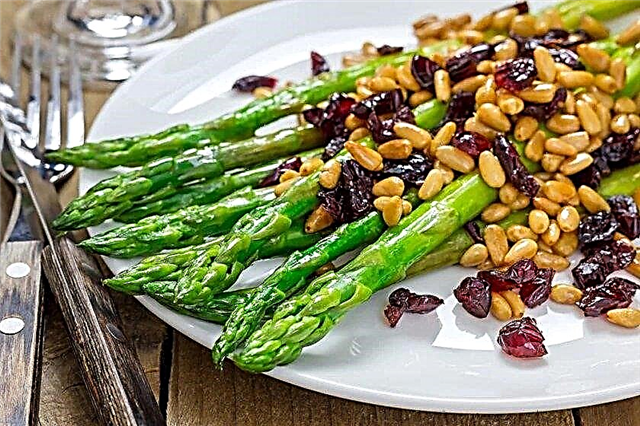
For those struggling with high cholesterol, remember that steamed asparagus reduces cholesterol. For the winter, you can cook salted asparagus, in which all the nutrients are perfectly preserved. In the cold season, it will be a great addition to the nutritional and vitamin diet.
In cosmetology
Asparagus juice cleanses the skin of dead cells and black spots, tones and rejuvenates the skin, removes bruises and swelling under the eyes. You need to wipe the face with juice in the morning and evening after washing and cleansing. An extract from this plant is an ingredient in soothing lotions, it lowers the pH level of the skin, acts as a conductor of nourishing creams.
Here are 2 options for recipes masks:
- Mask for face rejuvenation. For cooking, you need to take 2 tbsp. l finely chopped asparagus shoots, mix with 2 tbsp. low-fat cottage cheese, add a little cream to thin. The product must be applied to a cleansed face and hold for 10 minutes. After that, wash with warm water.
- Mask for moisturizing the skin. To prepare such a mask, you need to mix 1 tbsp. chopped asparagus, 2 tbsp. grated fresh cucumber, add 1 drop of rose oil. The mask must be applied to the face for 10 minutes. Rinse recommended cucumber juice or warm boiled water.
In folk medicine
In folk medicine, asparagus is used for various ailments.
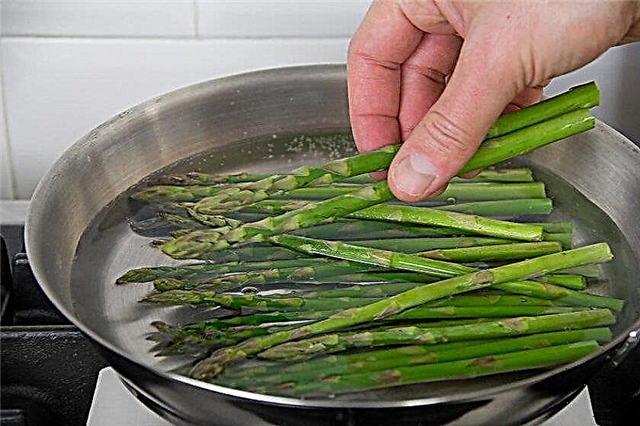
Recipes of some folk remedies are given below:
- With anemia and prostatitis you need to mix the juice from the young shoots of the plant and carrot juice in a ratio of 1: 2 and drink 3 times a day before meals, 1 tbsp. l
- With hypertrophy prostate gland or cirrhosis of the liver you need to prepare such an infusion: 1 tbsp. chopped fresh rhizomes pour 1 cup boiling water. The infusion should be brought to a boil, let it brew for an hour, strain and drink 3-4 times a day for 2 tbsp. 30 minutes before meals.
- With gout It is recommended to prepare an infusion of 3 tbsp. chopped shoots and 1.5 tbsp. hot water. The infusion should be put on a very slow fire and left until the moment when the water becomes 3 times less. After this, it is necessary to strain and squeeze out the thick. You need to use the broth 3 times a day, 2 hours before meals. It can also be replaced with freshly squeezed juice in the same amount.
- With cystitis gallstone disease, cholecystitis need to prepare a decoction of 2 tbsp. chopped stems and 500 ml of water. The infusion should be put on a slow fire for half an hour, then strain and add boiled water to its original level. Infusion should be taken 2-3 times a day, half a glass, half an hour before a meal.
By including healthy asparagus in your diet, you can maintain your health and even get rid of some ailments.



